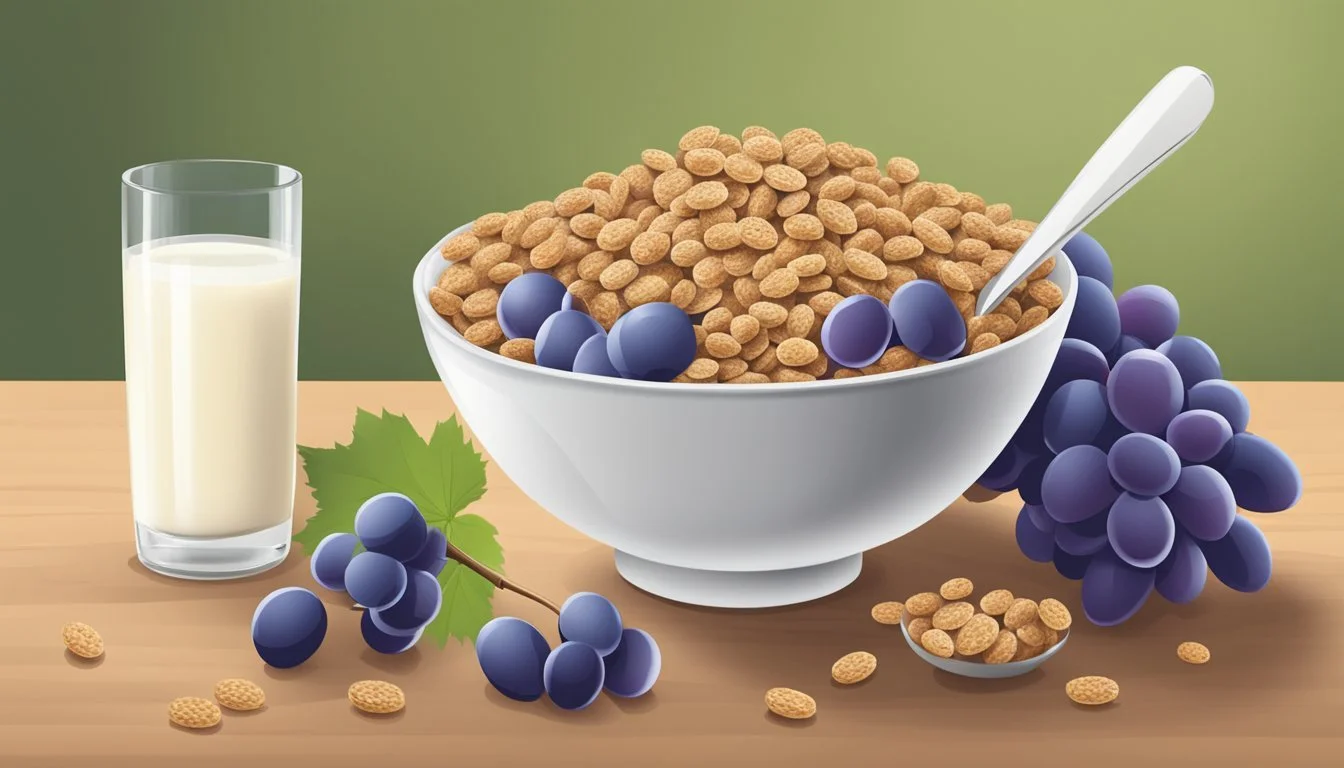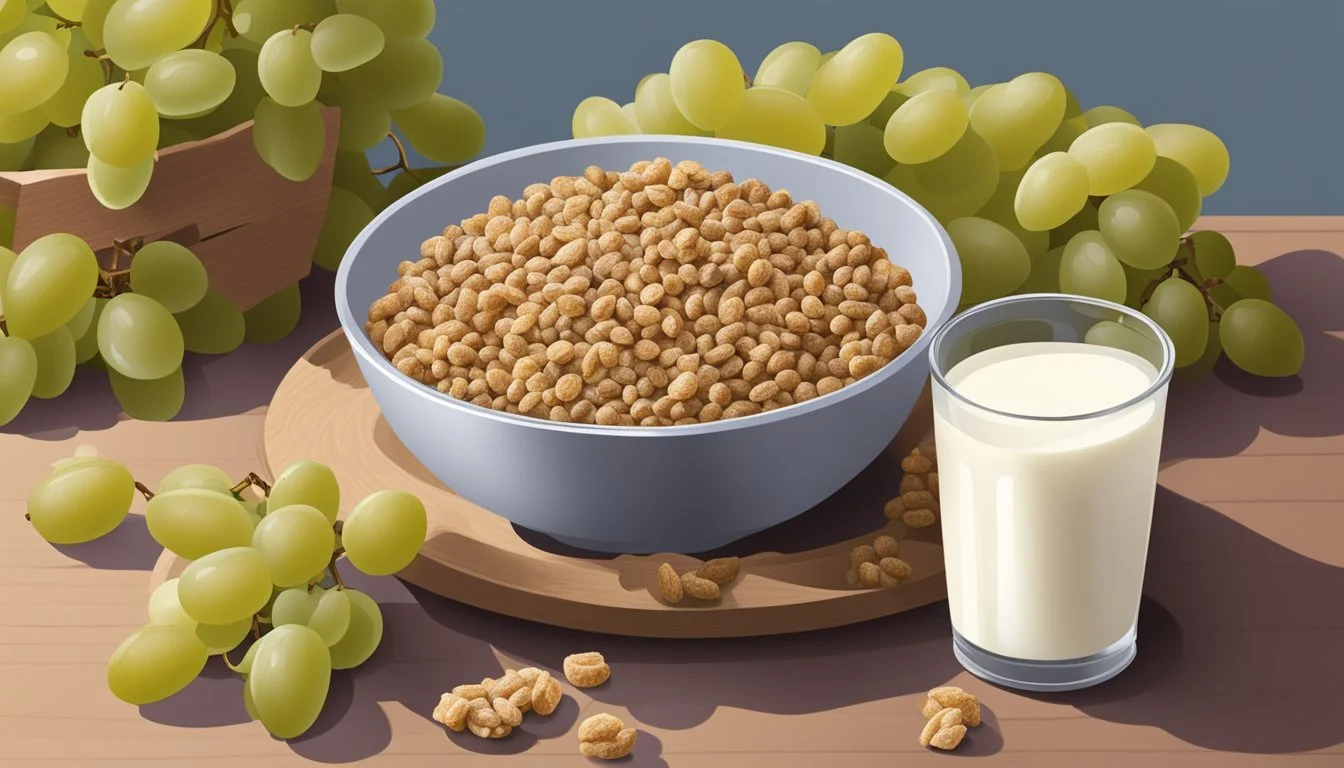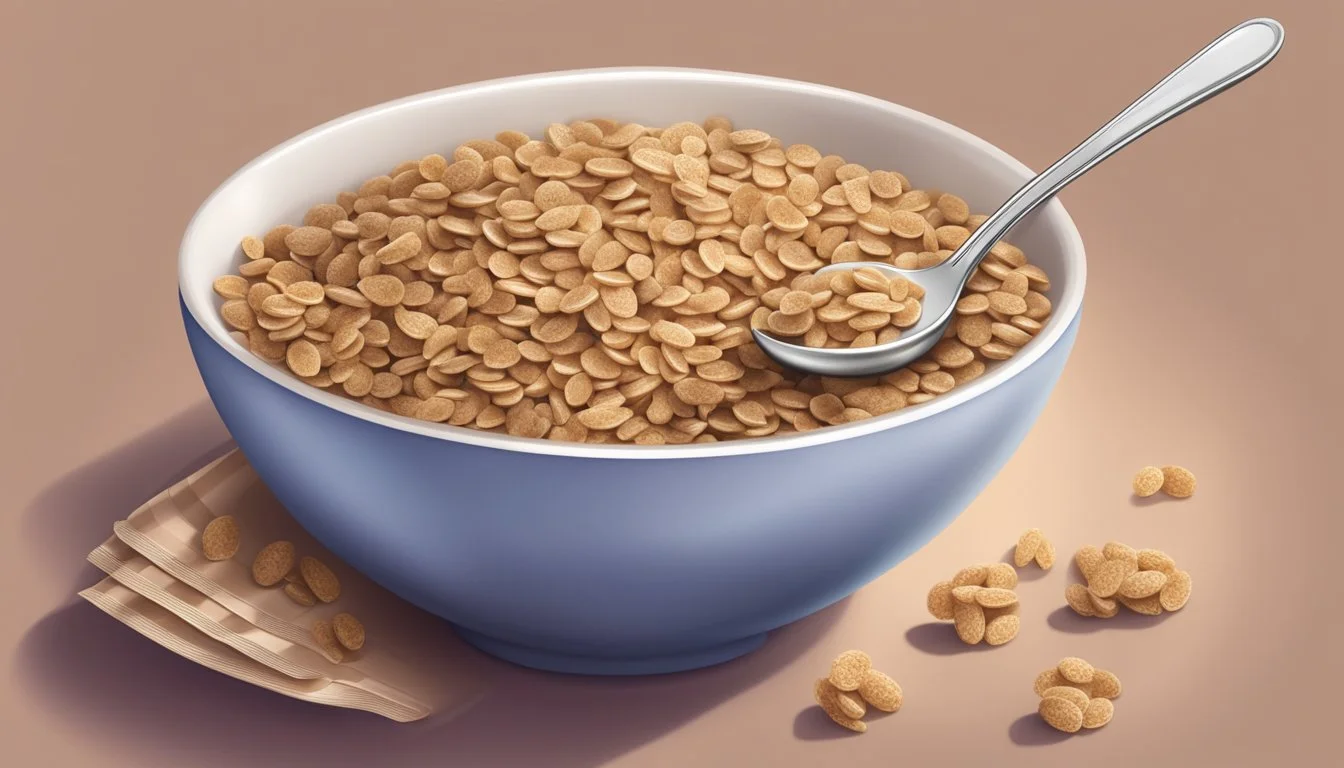Grape Nuts Nutrition Facts & More
Essential Facts About This Crunchy Cereal
Grape-Nuts cereal has been a breakfast staple for over a century, offering a unique crunchy texture and nutty flavor. This whole grain cereal packs a nutritional punch in each serving. A half-cup of Grape-Nuts provides 7 grams of fiber, 6 grams of protein, and significant amounts of iron and folic acid.
The cereal's name may be misleading, as it contains neither grapes nor nuts. Instead, Grape-Nuts is made primarily from wheat and barley. Its dense composition means a small serving can be quite filling, making it a popular choice for those looking to manage their calorie intake while still feeling satisfied.
While Grape-Nuts offers several nutritional benefits, it's important to note that it also contains 280 mg of sodium per serving. This aspect should be considered for individuals monitoring their salt intake. Despite this, the cereal remains a good source of essential nutrients and can be part of a balanced diet when consumed in moderation.
Nutritional Profile
Grape-Nuts cereal offers a dense nutritional profile with significant amounts of essential nutrients. This whole grain cereal provides a mix of macronutrients, minerals, and vitamins that contribute to a balanced diet.
Caloric Content
A standard serving size of Grape-Nuts cereal is approximately 58 grams or 1/2 cup. This serving contains about 210 calories. For those monitoring calorie intake, it's important to note that Grape-Nuts is relatively calorie-dense compared to some other breakfast cereals.
The calorie content primarily comes from complex carbohydrates, which provide sustained energy. A 100-gram portion contains around 359 calories, making it a substantial option for those with higher caloric needs.
Macronutrients
Grape-Nuts cereal provides a balanced mix of macronutrients. Each serving contains:
Protein: 6 grams
Total Carbohydrates: 47 grams
Total Fat: 1 gram
The protein content is comparable to that of a large egg, making Grape-Nuts a good plant-based protein source. The carbohydrates are primarily complex, derived from whole grains. The low fat content contributes to the cereal's heart-healthy profile.
Dietary fiber is a key component, with each serving providing 7 grams. This represents a significant portion of the daily recommended intake for fiber.
Sugar and Added Sugars
One of the notable aspects of Grape-Nuts' nutritional profile is its lack of added sugars. The cereal contains 5 grams of naturally occurring sugars per serving, primarily from the whole grain ingredients.
The absence of added sugars makes Grape-Nuts a suitable option for those monitoring their sugar intake or following low-sugar diets. This characteristic sets it apart from many other breakfast cereals that often contain high amounts of added sugars.
Minerals Content
Grape-Nuts is particularly rich in essential minerals:
Mineral Amount per serving % Daily Value Iron 16.2 mg 90% Zinc 3.8 mg 35% Copper 0.5 mg 60%
The cereal also provides significant amounts of phosphorus, magnesium, and selenium. These minerals play crucial roles in various bodily functions, including bone health, immune function, and cellular energy production.
Vitamins and Fortification
Grape-Nuts is fortified with several essential vitamins, enhancing its nutritional value:
Vitamin B1 (Thiamin): 50% DV
Vitamin B2 (Riboflavin): 25% DV
Vitamin B3 (Niacin): 25% DV
Vitamin B6: 25% DV
Folate: 50% DV
Vitamin B12: 25% DV
This fortification helps in meeting daily vitamin requirements, particularly B-complex vitamins that are crucial for energy metabolism and nervous system function.
The cereal also contains small amounts of vitamins A and D, contributing to its overall nutritional profile. These vitamins support various bodily functions, including immune health and bone strength.
Health Benefits
Grape Nuts cereal provides several nutritional advantages through its whole grain ingredients. This nutrient-dense food offers fiber, protein, vitamins, and minerals that support various aspects of health.
Dietary Fiber Advantages
Grape Nuts is an excellent source of dietary fiber, containing both soluble and insoluble types. A single serving provides 7 grams of fiber, which is about 25% of the daily recommended intake. Soluble fiber helps lower cholesterol levels and regulate blood sugar. Insoluble fiber promotes digestive health by preventing constipation and supporting regular bowel movements.
The high fiber content of Grape Nuts may contribute to heart health. Studies have shown that diets rich in whole grains and fiber can reduce the risk of heart disease. Fiber also promotes feelings of fullness, which can aid in weight management.
Protein and Muscle Maintenance
With 6 grams of protein per serving, Grape Nuts supports muscle maintenance and repair. Protein is essential for building and preserving lean body mass. The amino acids in Grape Nuts' whole grain ingredients provide the building blocks for various bodily functions.
Adequate protein intake is crucial for people of all ages, especially those engaged in physical activities or trying to maintain muscle mass as they age. The combination of protein and fiber in Grape Nuts can help stabilize blood sugar levels and provide sustained energy throughout the day.
Mineral Roles in Health
Grape Nuts is rich in several essential minerals that play vital roles in bodily functions. Iron supports oxygen transport in the blood and helps prevent anemia. Zinc is crucial for immune function and wound healing. Magnesium contributes to bone health, muscle function, and energy production.
The cereal also contains calcium, which is essential for strong bones and teeth. These minerals work together to support various physiological processes, including nerve function, hormone production, and cellular metabolism.
Vitamin Contributions
Grape Nuts is fortified with several important vitamins. B-complex vitamins, including thiamin, riboflavin, and niacin, play key roles in energy metabolism and nervous system function. Vitamin B12 is crucial for red blood cell formation and neurological health.
The cereal also contains vitamin D, which aids in calcium absorption and supports bone health. Vitamin A contributes to eye health and immune function. While not naturally high in vitamin C, some fortified versions may include this antioxidant vitamin, which supports immune health and collagen production.
The combination of vitamins in Grape Nuts helps support overall health and well-being, contributing to various bodily functions and potentially reducing the risk of certain nutrient deficiencies.
Dietary Considerations
Grape-Nuts cereal offers a mix of nutritional benefits and potential concerns to consider. Its composition impacts sodium, fat, carbohydrates, and allergen profiles.
Managing Sodium and Fat Intake
Grape-Nuts contains minimal fat, making it a suitable choice for low-fat diets. A 1/2 cup serving provides only 1g of total fat and 0.4g of saturated fat. This low fat content can help maintain healthy cholesterol levels.
Sodium content in Grape-Nuts is moderate. A serving contains about 270mg of sodium, which is 11% of the daily recommended value. While not excessive, individuals on sodium-restricted diets should monitor their intake.
The cereal is cholesterol-free, supporting heart health. Its whole grain content may contribute to lowering cholesterol levels when consumed as part of a balanced diet.
Understanding Carbohydrates
Grape-Nuts is high in carbohydrates, with a 1/2 cup serving containing 48g. This includes 7g of dietary fiber, which aids digestion and promotes feelings of fullness.
The cereal contains 5g of total sugars per serving, with no added sugars. This relatively low sugar content makes it a better choice compared to many sweetened cereals.
Grape-Nuts provides complex carbohydrates from whole grain wheat, which can offer sustained energy. The high fiber content results in lower net carbs, beneficial for those monitoring carbohydrate intake.
Allergens and Dietary Restrictions
Grape-Nuts contains wheat, making it unsuitable for those with celiac disease or gluten sensitivity. The cereal is not gluten-free.
It's free from common allergens like nuts, soy, and dairy in its basic form. However, individuals with severe wheat allergies should avoid it.
Grape-Nuts is suitable for vegetarian and vegan diets. It doesn't contain any animal-derived ingredients.
The cereal's ingredient list is simple, primarily consisting of whole grain wheat and wheat flour. This can be appealing to those seeking minimally processed foods.
Product Ingredients
Grape-Nuts cereal contains a simple yet nutritious blend of ingredients. The product's composition focuses on whole grains and essential nutrients, with minimal additives.
Main Constituents
Whole grain wheat flour forms the primary ingredient in Grape-Nuts, providing a robust nutritional foundation. This wholesome component contributes significant fiber, protein, and various micronutrients to the cereal. Malted barley flour adds a subtle sweetness and enhances the cereal's texture.
Salt is included to balance flavors, while dried yeast contributes to the cereal's unique taste profile. These core ingredients work together to create Grape-Nuts' distinctive crunch and nutty flavor.
Additional Components
Grape-Nuts incorporates several fortifying elements to enhance its nutritional value. Reduced iron is added to support healthy blood cell production and oxygen transport throughout the body. The cereal also contains niacinamide, a form of vitamin B3 that aids in energy metabolism.
Other B-vitamins present include:
Pyridoxine hydrochloride (vitamin B6)
Thiamin mononitrate (vitamin B1)
These vitamins play crucial roles in maintaining proper nervous system function and energy production.
Understanding Food Additives
The additives in Grape-Nuts serve specific purposes related to nutrition and product quality. Fortification with vitamins and minerals aims to address common nutrient deficiencies and support overall health. These added nutrients are carefully selected to complement the cereal's natural nutritional profile.
It's worth noting that Grape-Nuts contains no artificial colors, flavors, or preservatives. The product relies on its simple ingredient list to maintain quality and shelf stability. This approach aligns with consumer preferences for minimally processed foods with recognizable ingredients.
Culinary Uses
Grape-Nuts cereal offers versatility in the kitchen beyond a simple breakfast bowl. Its crunchy texture and nutty flavor make it a unique ingredient in various dishes and recipes.
Recipes and Pairings
Grape-Nuts can add crunch to yogurt parfaits or smoothie bowls. Mix them into homemade granola or trail mix for extra texture and nutrition. Use crushed Grape-Nuts as a coating for baked chicken or fish to create a crispy crust. Incorporate them into muffin or quick bread recipes for added fiber and a subtle crunch.
For desserts, sprinkle Grape-Nuts over ice cream or frozen yogurt. Use them as a base for no-bake cheesecake crusts or mix into cookie dough for a nutty flavor. Grape-Nuts can also be used to top fruit crisps or cobblers for a crunchy streusel-like topping.
Serving Suggestions
For a classic breakfast, serve Grape-Nuts with cold milk and fresh fruit. Top with sliced bananas, berries, or chopped nuts for added flavor and nutrition. For a warm option, heat Grape-Nuts with milk and a touch of honey or maple syrup.
Use Grape-Nuts as a topping for hot oatmeal or mix into cottage cheese for a protein-packed snack. Sprinkle over Greek yogurt with a drizzle of honey for a balanced breakfast or afternoon treat. For a savory twist, use Grape-Nuts as a crunchy salad topper or mix into veggie burgers for added texture.
Consumer Information
Grape-Nuts cereal provides essential nutrition information and storage guidelines on its packaging. Consumers can easily access details about serving sizes, nutritional content, and proper storage methods.
Packaging and Labeling
Post's Grape-Nuts cereal comes in a 20-ounce box with clear labeling. The packaging displays prominent nutrition facts, including serving size and calorie content. A typical serving is 1/2 cup (58g), containing 210 calories.
The label lists key nutrients like protein (6g), fiber (7g), and various vitamins and minerals. Grape-Nuts contains no added sugars, which is clearly stated on the box. Ingredient information is also provided, showing whole grain wheat flour as the primary component.
Allergen warnings are displayed prominently, alerting consumers to potential wheat content. The packaging includes preparation suggestions and serving ideas to enhance the cereal-eating experience.
Shelf Life and Storage
Grape-Nuts cereal has a relatively long shelf life when stored properly. The box typically includes a "best by" date, indicating optimal quality and freshness.
To maintain freshness, store Grape-Nuts in a cool, dry place away from direct sunlight. Once opened, transfer the cereal to an airtight container to prevent moisture absorption and maintain crispness.
Properly stored, Grape-Nuts can remain fresh for several months past the printed date. However, consume within a reasonable timeframe for best taste and texture. Check for signs of spoilage, such as off-odors or visible mold, before consumption.
Avoid storing Grape-Nuts in humid environments or near strong-smelling foods, as the cereal may absorb odors. For extended freshness, consider refrigeration in a sealed container, particularly in warm climates.






